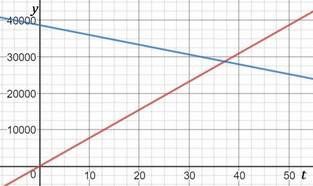
Mathematics, 30.06.2019 15:00 queenkimm26
You are buying a car for $38713. your payments are $774 per month and you put $2500 as a down payment. you finance the car for 5 years. at the end of 12 years, your car will depreciate to zero. calculate the number of months it will take your car to equal the value of your payments.

Answers: 1


Another question on Mathematics


Mathematics, 21.06.2019 17:00
In tossing one coin 10 times, what are your chances for tossing a head? a tail? 2. in tossing one coin 100 times, what are your chances for tossing a head? a tail? 3. in tossing one coin 200 times, what are your chances for tossing a head? a tail? deviation = ((absolute value of the difference between expected heads and observed heads) + (absolute value of the difference between expected tails and observed tails)) divided by total number of tosses. this value should always be positive. 4. what is the deviation for 10 tosses? 5. what is the deviation for the 100 tosses? 6. what is the deviation for 200 tosses? 7. how does increasing the total number of coin tosses from 10 to 100 affect the deviation? 8. how does increasing the total number of tosses from 100 to 200 affect the deviation? 9. what two important probability principles were established in this exercise? 10. the percent of occurrence is the obtained results divided by the total tosses and multiplied by 100%. toss the coins 100 times and record your results. calculate the percent occurrence for each combination. percent head-head occurrence: percent tail-tail occurrence: percent head-tail occurrence:
Answers: 3

Mathematics, 21.06.2019 20:00
Parabolas y=−2x^2 and y=2x^2 +k intersect at points a and b that are in the third and the fourth quadrants respectively. find k if length of the segment ab is 5.
Answers: 1

Mathematics, 21.06.2019 20:30
Does the function satisfy the hypotheses of the mean value theorem on the given interval? f(x) = 4x^2 + 3x + 4, [−1, 1] no, f is continuous on [−1, 1] but not differentiable on (−1, 1). no, f is not continuous on [−1, 1]. yes, f is continuous on [−1, 1] and differentiable on (−1, 1) since polynomials are continuous and differentiable on . there is not enough information to verify if this function satisfies the mean value theorem. yes, it does not matter if f is continuous or differentiable; every function satisfies the mean value theorem.
Answers: 1
You know the right answer?
You are buying a car for $38713. your payments are $774 per month and you put $2500 as a down paymen...
Questions

Biology, 16.03.2020 11:24




Social Studies, 16.03.2020 11:26


Chemistry, 16.03.2020 11:27

Mathematics, 16.03.2020 11:27

Mathematics, 16.03.2020 11:30

Physics, 16.03.2020 11:30

Mathematics, 16.03.2020 11:35

Mathematics, 16.03.2020 11:36

Mathematics, 16.03.2020 11:40



Mathematics, 16.03.2020 11:42

Biology, 16.03.2020 11:42


Spanish, 16.03.2020 11:45

Mathematics, 16.03.2020 11:45




